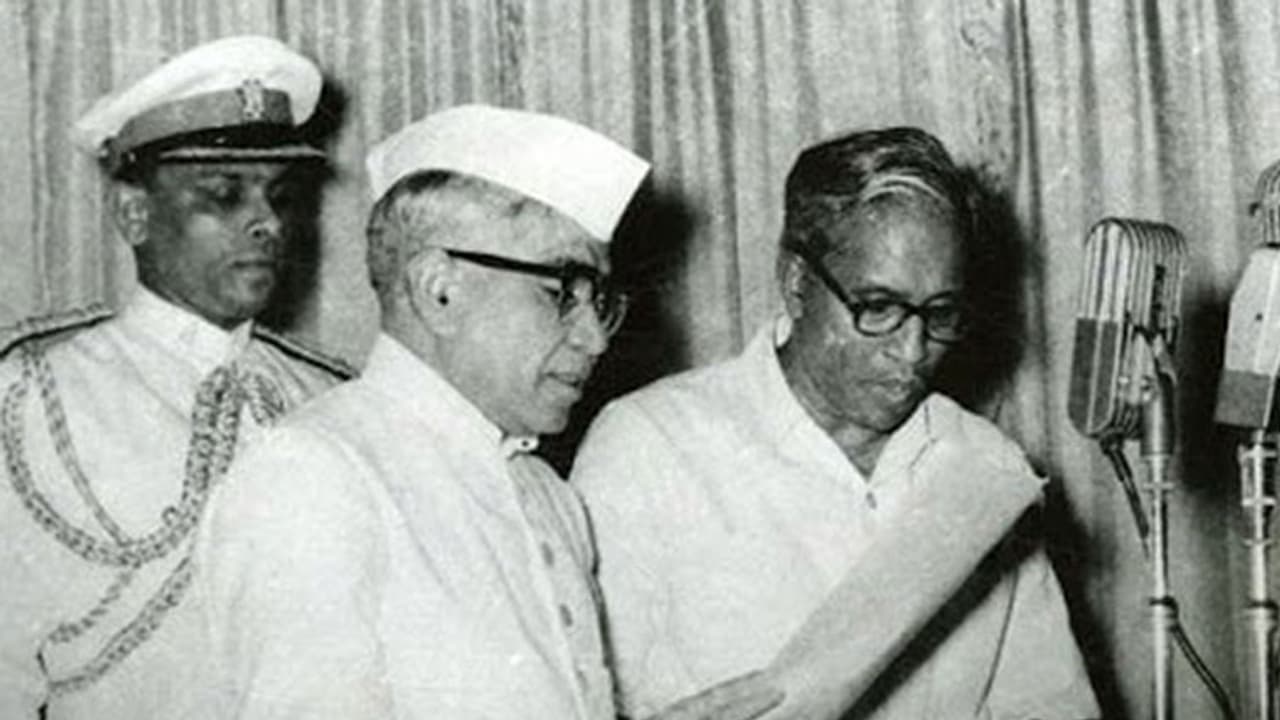While the first Communist government instilled great hope for the people of Kerala, most of them poor, some sections in the society were apprehensive of the Communists in power. The jubilation over the Communists coming to power in Kerala was short lived.
Kerala erupted in celebrations sixty years back on 1 April 1957 when the first Kerala Assembly. The general mood in the state, which was officially formed on 1 November 1956, was of new hope, even as the western world read the news from the small southern Indian state with shock and disbelief, because Communist Party of India (CPI) was all set to form the government. For the West, Communists coming to power in an Indian state through popular ballot was sort of a blasphemy.

Much before the general elections in 1957, Ellsworth Bunker, American diplomat to India who played key role in Vietnam war in the 1960s, had warned that there was a "strong possibility of the accession to power of some kind of extremist government" in India. By 'extremists,' he meant Communists, whom he feared would gain the most from the political uncertainty in the country. The cost of losing India to Communism, he noted would be even higher than the loss of China to the Free World. (The Cold War in South Asia by Paul M. McGarr)

Though Bunker's prediction did not come true in its entirety, Communist Party of India (CPI) came to power in Kerala, which was reason enough to shock the West. For the general feeling among the US-led western think tanks was that democracy and Communism won't gel. And for the Communists, entering parliamentary democracy was only an interim strategy too. Media coverage of Indian general elections was obsessed with the victory of Communists in Kerala and the sweeping success of Indian National Congress in throughout the country was largely ignored. The US was quick to find a Moscow connection. In the Cold War era, that meant very ugly as far as the West is concerned.
President Eisenhower authorised the Central Intelligence Agency to mount a covert operation to subvert the CPI administration in Kerala
The CPI won 60 seats out of the total of 126 seats to become the single largest party in the assembly. The Congress won 43 out of 124 seats it contested. On 5 April 1957, the 11-member ministry headed by EMS Namboodiripad assumed power with the support of five independent legislators. Namboodiripad was also the first non-Congress Chief Minister in the country.
Besides Kerala, the CPI had considerable influence in Bengal, Bihar, Pujab and Andhra Pradesh. But it could translate it into results only in Kerala and make a decisive lead over the rival Congress. But the jubilation among the left in Kerala and across the world was short-lived.

While the first Communist government instilled great hope for the people of Kerala, most of them poor, some sections in the society were apprehensive of the Communists in power. With the burden of high hopes on its shoulders, EMS government was in a hurry to kick start revolutionary reforms, including land reforms. It also unveiled radical reforms in education sector. Kerala model of development was built on the bedrock of reforms mooted by the EMS government.

The education reforms were eyed with suspicion by some sections of the society, especially the church. Soon a rainbow coalition of various communities started public protests against the Communist government. The Communist Party alleged later that the US secret service Central Intelligence Agency (CIA) played a key role in funding the anti-government agitations, known as 'Vimochana Samaram' (Liberation stir).
The dismissal of EMS government created rift in the Gandhi family, prompting Feroz to call his wife Indira a ‘fascist.’
'Vimochana Samaram' peaked in July 1959, prompting a reluctant Jawaharlal Nehru to invoke article 356 of the constitution and bring in President's Rule in the state. The dismissal of the first popularly elected Communist government in the world also made headlines, just as it came to power.
Later, it was proved that the allegations of CIA-funding were not completely unfounded. Just after the Communists assumed power, the US had started to watch the developments in Kerala. Paul M McGarr said in his book that the White House instructed State Department to increase the amount of fund for publicity in the subcontinent with a focus on South India. "...President Eisenhower authorised the Central Intelligence Agency to mount a covert operation to subvert the CPI administration in Kerala" after Henry Ramsey, American Consul-General in Madras cautioned after touring Kerala that "...in EMS and his Cabinet, Congress is confronted with a shrewd, young, zealous, closely-knit team." Ramsey also felt that Congress had no clear strategic line to displace or replace from the Communist government.
"Between 1957 and 1959, by secretly channeling funds to local Congress party and labour leaders, the CIA promoted industrial unrest and political turmoil in the state," Macgarr noted in his book.
There are numerous accounts to prove that Nehru was not in favour of dismissing EMS government. He had even regretted taking the decision, taken under the insistence of Indira Gandhi, the then president of Indian National Congress.
In a recent biography of Feroz Gandhi, (Feroz the Forgotten Gandhi), author Bertil Falk, said quoting eminent political journalists that the dismissal of EMS government had created rift in the Gandhi family, prompting Feroz to call his wife Indira Gandi a ‘fascist.’
